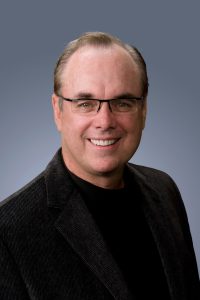Derek Barton harks back to the visionary work of Apple’s Steve Jobs and encourages you to “think different” to help save the fitness industry.
“Here’s to the crazy ones. The misfits. The rebels. The troublemakers. The round pegs in the square holes. The ones who see things differently. They’re not fond of rules. And they have no respect for the status quo. You can praise them, disagree with them, quote them, disbelieve them, glorify them or vilify them. About the only thing you can’t do is ignore them. Because they change things. They invent. They imagine. They heal. They explore. They create. They inspire. They push the human race forward.
“Maybe they have to be crazy. How else can you stare at an empty canvas and see a work of art? Or sit in silence and hear a song that’s never been written? Or gaze at a red planet and see a laboratory on wheels?
“We make tools for these kinds of people. While some see them as the crazy ones, we see genius. Because the people who are crazy enough to think they can change the world, are the ones who do.”
That was the original ad copy from Apple’s famous 1997 “Think Different” campaign. One of the people who worked on that campaign gave me a framed copy of it, which proudly hangs on my office wall. Is it any wonder that those words back then still reflect the Apple brand today? And, even more important, is it any wonder that they still reflect the feelings of Apple’s loyal customers, like me?
I’m one of those crazy ones – a misfit, a rebel. I am definitely not fond of rules because, if someone makes them, then they can certainly be broken. How many times does a company’s staff respond to our complaints about their products or services with that old line, “Sorry, those are the rules.” And I answer every time with, “I make the rules at my company and allow my staff to break them when appropriate to satisfy my customers.”
I see things differently too and have no respect for the status quo. Visionaries and innovators like Steve Jobs have taught me to “think different”, which has helped me tremendously in my marketing career.
Upon Steve’s return to Apple in 1997, when the company was in trouble, he said to his team, “Our goal is not just to make money, but to make great products.” Who in the health club industry shares that goal? Certainly not the majority, which may be one of the big reasons why 85% of people around the world don’t step foot inside fitness centres.
Unfortunately, the health club industry has not figured out how to deal with the fact that most people don’t want its “memberships”. Even when people do join, 42% don’t come back after 30 days. 72% don’t return after 90 days. Further surveys have revealed that the health club industry is the third worst business for retention. That’s sad considering there is nothing more important on earth than people’s health and fitness.
In response, gym owners have created cheaper memberships and “no contracts” to get people to join. We continue to find new and old ways to make money. We don’t make the fitness experience better, just cheaper, which still is not winning over that 85%. So, time to ask, “What would a company like Apple do if it was in the health club business?”
For starters, Apple would build incredible gyms with yes, genius bars, to help people better understand their bodies and how to get the most out of exercise and nutrition. Apple gyms would have a sense of play, energy, and the design would be second to none. The pieces of equipment would be designed like Apple products – cool, elegant and easy to use. Each piece would give you a sense of “Wow”. It would be the ultimate showroom, where people would be eager to try out each new machine every time they visited, just like Apple’s 531 stores around the world, which are packed with excited people day and night.
Are there any such “Apple” gyms out there in the world today? Not exactly, but I have seen some impressive health clubs like Gold’s Gym, Gainesville Health & Fitness, Equinox, UFC Gym, Lifetime Fitness and Crunch to name a few.
Can you imagine the great advertising Apple would create? It would use its brilliant marketing to move and inspire people to WANT to work out in its gyms. Apple would never copy someone’s “low-cost” model. It would never advertise price because Apple always believed, as I do, that if price is all one focuses on, people will think that’s all you have to offer. As Apple resuscitated the music industry with its “iTunes”, it has been trying to make the world healthier and more fit with its Apple Watch, which contains so many health and fitness apps on it.
From Apple’s beginning, Steve Jobs set out to make products that would help us become more productive and more creative. With every release of an Apple product, he made you feel like a kid on Christmas morning. People camp out overnight on the sidewalk outside Apple stores waiting for their new toys. People even wait in line for a new Apple store to open. When was the last time you saw a line around the block waiting for a new health club to open?
Steve knew what we wanted before we did. No market research, no surveys, no focus groups – never. He often said, “People really don’t know what they want until we show it to them.” He knew instinctively. He trusted his instincts. Steve looked at other products in the marketplace and said, “We can do better.” That mantra gave the world the best computer, the best laptop, the best portable music player, the best music download site, the best smartphone, the best tablet, the best apps and the best TV streaming service. The hits just keep on coming.
Steve Jobs always challenged himself and his team to make something better, even it was one of their own products or services. Tim Cook, Apple’s current CEO, continues leading that charge. For Apple, it’s all about simplicity and ease of use, while making sure every product and service is designed like no other. All of that comes with a price, a price all we Apple fans gladly pay because we too want something better. So do people who are overweight and obese, but they are not knocking down our gym doors.
If you own an Apple product or know someone who does, isn’t it amazing how passionate we are about those devices? But how many people brag about their membership at your health club? How many of your members are like we Apple users, trying so hard to convert people? In the health club industry, we have so many member referral programmes but they seldom work.
Apple became the most valuable company for one simple reason: Steve Jobs wanted to change the world. He did and, by doing so, he changed our lives. Apple continues to change our lives and for that, we remain loyal customers. We’re never jumping ship for something cheaper!
When Steve Jobs died, the whole world mourned. I had never seen more news about the death of a CEO, and witnessed millions of fans around the world putting flowers and Post-it notes on his stores thanking him for all that he did for them. I bet that most health club members don’t even know who the owner of their gym is.
Sadly, we have taken the passion and excitement out of our health clubs and reduced it to a commodity. People would rather take diet pills or drink “magic potions” or even have their stomach stapled than eat right and come into a fitness centre and lose fat the right way.
Around 25% of US health clubs and studios have closed permanently since the pandemic began. Many gym owners and staff blamed the government for not defining them as “essential workers”. One would think that our health and fitness is “essential”.
Like Apple did with Steve Jobs, who saved its brand, it’s time to rally around our own visionaries and innovators to save our health club industry.
Time to “Think Different”.
Explore more thinking from Dr Paul Batman on developing the fitness industry for the future in this FitPro blog post.

Derek Barton
Derek Barton is the President and CEO of Barton Productions. Derek is known as “The Brand Man,” having nearly 40 years in building brands. From 1985 to 2005 he was the head of Marketing at Gold’s Gym International. He was instrumental in building Gold’s Gym into one of the most respected and recognized brands in the fitness industry and the largest international co-ed gym chain.
Derek is a much sought-after public speaker on marketing, advertising, branding and customer service. In addition to consulting and speaking around the world, Derek is widely published in periodicals for his marketing and branding expertise.







